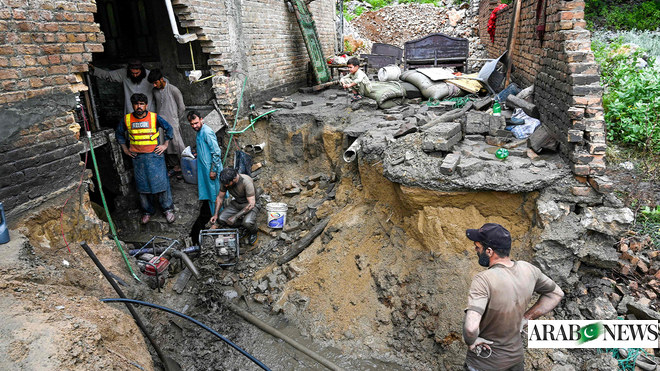Pakistan Army buries soldier killed by ‘violent mob’ during Balochistan human rights protests
ISLAMABAD: Amid rising tensions between security forces and Balochistan ethnic activists protesting against alleged human rights violations in the province, the Pakistan Army’s media wing said on Tuesday that a soldier killed in an attack by a “violent mob” during the ongoing Balochistan human rights movement has been buried in the country’s southwest.
The Baloch Yaqjeti Committee (BYC), which defends the rights of Balochistan’s minority Baloch people, convened a “Baloch Raj Muchi,” or Balochistan National Rally, on Sunday in Balochistan’s port city of Gwadar to protest against alleged human rights violations, extrajudicial killings and enforced disappearances in Balochistan that human rights activists and victims’ families blame on Pakistani security forces, a charge the government and security agencies deny.
Tensions in the province rose on Saturday when more than a dozen protesters were injured in clashes with security forces in Mastan district on their way to Gwadar for a rally on Sunday, according to officials and protesters. The clashes came amid a shutdown of internet, mobile phone and broadband services in parts of Balochistan. Gulzar Dost Baloch, a Balochistan Republican Party member who was leading a caravan in Quetta, said “security forces opened fire on our bus” as his supporters were leaving Mastan for Gwadar. One protester was killed in the clashes, according to the Balochistan Republican Party.
The army’s media wing reported on Monday that 16 people, including one Pakistani soldier and an officer, were injured in an “unprovoked attack” during the clashes.
“Sepoy Sher Baloch (30), a resident of Nasirabad district of Balochistan, has been martyred,” the Inter-Services Public Relations (ISPR) said in a statement. “Funeral prayers for the martyr have been offered.”
The military said Balochistan Interior Minister Mir Zia Langobe, senior officers and civil servants of the Pakistan Army attended the funeral prayers.
“After the funeral, the bodies of the martyrs were sent to their native places and buried with full military honours,” ISPR said.
Reacting to the alleged unprovoked attack on Monday, the BYC said soldiers from the army and FC paramilitary forces “launched yet another brutal and violent attack on a peaceful Balochistan national assembly sit-in in Gwadar”. The group said they had opened fire “indiscriminately on peaceful protesters”.
“Foreign Hands”
Pakistan’s Balochistan province, which borders Iran and Afghanistan, has been the scene of a small-scale separatist insurgency for the past two decades. They say they are fighting what they say is the federal government’s unfair exploitation of the province’s wealth. The Pakistani government denies the allegations and says it is working to develop the impoverished province. The government and military frequently accuse neighboring India, Afghanistan and Iran of stoking tensions in Balochistan and funding the insurgency, charges the country denies.
On Friday, authorities sealed all entry and exit points of the provincial capital Quetta and invoked Section 144 of the Criminal Procedure Code, which bans gatherings of more than four people, in parts of the province as BYC supporters tried to leave for the Gwadar protest led by activist Dr Mahlangu Baloch. Protesters then staged sit-ins on major highways in Quetta, Mastun, Kech and Turbat districts.
The BYC on Monday ordered the provincial government to release all its detained members within 48 hours, warning that it would expand its protests, now in their fourth day, to the whole of Balochistan.
“If the government does not accept our demands, we will expand our protests to the whole of Balochistan,” Bebag Baloch, a BYC leader leading the protests in Mastun, told Arab News on Monday, adding that the group wanted all its arrested members to be released within 48 hours and for highways in the province to be opened to allow people to travel freely to protest sites.
Deputy Governor Quetta Saad bin Asad said on Monday that 22 people had been arrested for blocking a main road and disrupting traffic in the provincial capital.
Gwadar, on the Arabian Sea coast, is at the heart of the China-Pakistan Economic Corridor (CEPC), under which Beijing is pumping tens of billions of dollars into Pakistan’s massive transport, energy and infrastructure projects. But the work has been hit by Islamabad’s struggle to meet financial obligations and militant attacks on Chinese positions in Balochistan and other parts of Pakistan.
Langove alleged that the recent protests were a “conspiracy” against CPEC and that a “foreign hand” was instigating the protests.
“Despite attacks by protesters, the people of Balochistan, police and security forces showed restraint in maintaining peace,” Langoub told Arab News.

